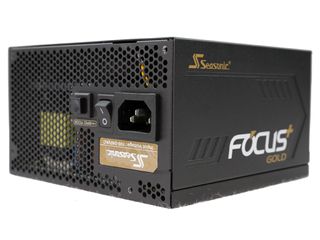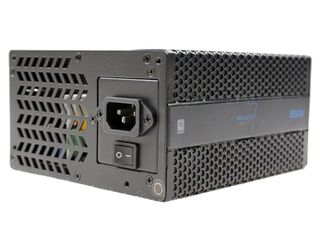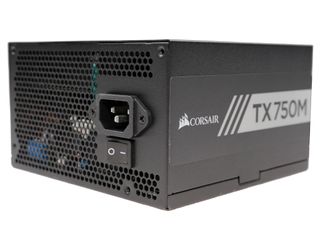FSP Hydro PTM 750W PSU Review
Why you can trust Tom's Hardware
Load Regulation, Hold-Up Time & Inrush Current
To learn more about our PSU tests and methodology, please check out How We Test Power Supply Units.
Primary Rails And 5VSB Load Regulation
Load Regulation testing is detailed here.








Hold-Up Time
Our hold-up time tests are described in detail here.







The hold-up time is close to 23ms, while FSP's power-good signal is accurate.
Inrush Current
For details on our inrush current testing, please click here.


The inrush currents are kept under control using both voltage inputs.
Load Regulation And Efficiency Measurements
The first set of tests reveals the stability of the voltage rails and the HPT750M's efficiency. The applied load equals (approximately) 10 to 110 percent of the PSU's maximum load in increments of 10 percentage points.
We conducted two additional tests. During the first, we stressed the two minor rails (5V and 3.3V) with a high load, while the load at +12V was only 0.1A. This test reveals whether a PSU is compatible with Intel's C6/C7 sleep states or not. In the second test, we determined the maximum load the +12V rail could handle with minimal load on the minor rails.
| Test # | 12V | 5V | 3.3V | 5VSB | DC/AC (Watts) | Efficiency | Fan Speed | PSU Noise | Temps (In/Out) | PF/AC Volts |
|---|---|---|---|---|---|---|---|---|---|---|
| 1 | 4.427A | 1.985A | 1.962A | 0.996A | 74.771 | 86.472% | 865 RPM | 25.2 dB(A) | 38.38°C | 0.989 |
| 12.012V | 5.044V | 3.360V | 5.010V | 86.468 | 40.67°C | 115.19V | ||||
| 2 | 9.910A | 2.977A | 2.954A | 1.200A | 149.753 | 90.290% | 865 RPM | 25.2 dB(A) | 38.64°C | 0.996 |
| 11.997V | 5.033V | 3.349V | 4.989V | 165.858 | 41.64°C | 115.19V | ||||
| 3 | 15.754A | 3.488A | 3.470A | 1.405A | 224.841 | 91.467% | 865 RPM | 25.2 dB(A) | 38.93°C | 0.998 |
| 11.981V | 5.023V | 3.339V | 4.973V | 245.817 | 42.64°C | 115.20V | ||||
| 4 | 21.607A | 3.990A | 3.960A | 1.610A | 299.695 | 91.728% | 865 RPM | 25.2 dB(A) | 39.19°C | 0.998 |
| 11.965V | 5.013V | 3.330V | 4.956V | 326.720 | 44.00°C | 115.22V | ||||
| 5 | 27.129A | 4.991A | 4.970A | 1.820A | 374.614 | 91.518% | 865 RPM | 25.2 dB(A) | 39.70°C | 0.999 |
| 11.949V | 5.003V | 3.318V | 4.939V | 409.334 | 45.51°C | 115.20V | ||||
| 6 | 32.660A | 6.016A | 5.984A | 2.030A | 449.558 | 90.973% | 865 RPM | 25.2 dB(A) | 40.44°C | 0.999 |
| 11.934V | 4.990V | 3.308V | 4.916V | 494.164 | 48.32°C | 115.21V | ||||
| 7 | 38.212A | 7.025A | 7.006A | 2.246A | 524.473 | 90.256% | 910 RPM | 27.1 dB(A) | 41.38°C | 0.999 |
| 11.918V | 4.979V | 3.296V | 4.895V | 581.096 | 51.03°C | 115.44V | ||||
| 8 | 43.780A | 8.058A | 8.032A | 2.457A | 599.473 | 89.453% | 1235 RPM | 34.9 dB(A) | 42.54°C | 0.999 |
| 11.902V | 4.968V | 3.285V | 4.878V | 670.155 | 53.40°C | 115.21V | ||||
| 9 | 49.799A | 8.574A | 8.577A | 2.462A | 674.494 | 88.651% | 1330 RPM | 36.9 dB(A) | 44.02°C | 0.999 |
| 11.886V | 4.958V | 3.275V | 4.868V | 760.842 | 57.17°C | 115.20V | ||||
| 10 | 55.788A | 9.096A | 9.091A | 2.574A | 749.326 | 87.774% | 1610 RPM | 41.7 dB(A) | 45.83°C | 0.998 |
| 11.869V | 4.948V | 3.265V | 4.852V | 853.697 | 60.96°C | 115.21V | ||||
| 11 | 62.187A | 9.113A | 9.118A | 2.578A | 824.225 | 86.890% | 1800 RPM | 44.7 dB(A) | 47.22°C | 0.998 |
| 11.852V | 4.939V | 3.256V | 4.844V | 948.579 | 63.55°C | 115.19V | ||||
| CL1 | 0.098A | 14.026A | 14.005A | 0.004A | 117.934 | 85.301% | 995 RPM | 29.2 dB(A) | 44.15°C | 0.994 |
| 11.999V | 5.007V | 3.321V | 5.019V | 138.256 | 54.79°C | 115.21V | ||||
| CL2 | 62.448A | 1.003A | 1.001A | 1.001A | 754.548 | 88.064% | 1350 RPM | 37.1 dB(A) | 45.29°C | 0.998 |
| 11.871V | 4.969V | 3.291V | 4.944V | 856.816 | 61.11°C | 115.21V |
Load regulation is a little above 1% at +12V, and it's a bit looser at 5V. The 3.3V rail falls outside of the 3% range, while the 5VSB rail comes closer to 4%. There is definitely room for improvement here.
Noise is kept under control until the seventh test, and it only surpasses 40 dB(A) during the full load and overload tests when we push the HPT750M at temperatures up to 46-47°C.
We also notice a high PF, even at lower loads. FSP does a very good job with its APFC converter.
MORE: Best Power Supplies
MORE: How We Test Power Supplies
MORE: All Power Supply Content
Current page: Load Regulation, Hold-Up Time & Inrush Current
Prev Page Teardown & Component Analysis Next Page Efficiency, Temperature & NoiseStay On the Cutting Edge: Get the Tom's Hardware Newsletter
Get Tom's Hardware's best news and in-depth reviews, straight to your inbox.

Aris Mpitziopoulos is a contributing editor at Tom's Hardware, covering PSUs.


